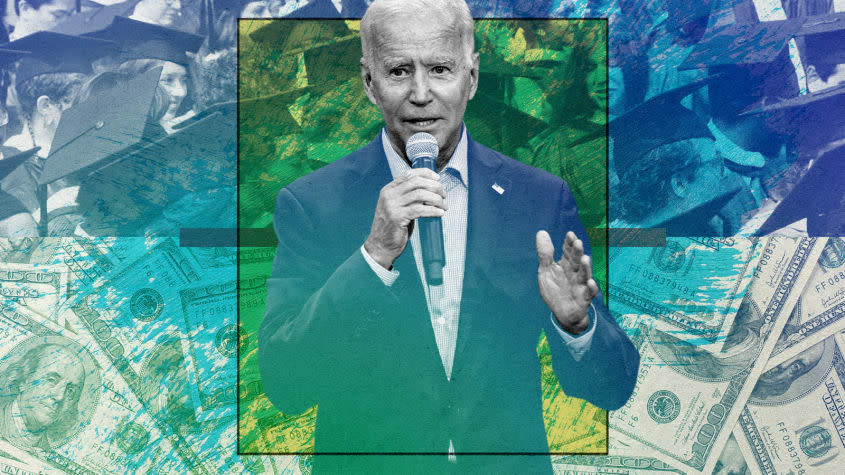Did Biden forgive student loans?

- Oops!Something went wrong.Please try again later.
- Oops!Something went wrong.Please try again later.
- Oops!Something went wrong.Please try again later.
The Supreme Court at the end of June struck down President Biden's controversial student loan forgiveness program. The program aimed to forgive up to $10,000 in federal student loans for borrowers earning less than $125,000 a year, and up to $20,000 for Pell Grant recipients. The decision will soon end a yearslong repayment pause first enacted under the Trump administration, and represents a huge blow to Biden's platform for reelection.
What did the Supreme Court decide?
In a 6-3 decision along party lines, the court's conservative majority ruled that the Department of Education is not authorized to cancel student debt, rendering the student loan forgiveness program moot. "The authority to 'modify' statutes and regulations allows the Secretary to make modest adjustments and additions to existing provisions, not transform them," Chief Justice John Roberts wrote in the majority opinion. "The question here is not whether something should be done; it is who has the authority to do it."
In her dissent, Justice Elena Kagan took issue with the majority's focus on the so-called "major questions doctrine," a legal theory that says Congress must first authorize the executive branch to take actions of "economic or political significance." The ruling "moves the goalposts for triggering" this doctrine, Kagan wrote. "Who knows – by next year, the Secretary of Health and Human Services may be found unable to implement the Medicare program under a broad delegation because of his actions' 'economic impact.'"
In trying to cancel student debt, Biden was relying on authority pulled from the 9/11-era HEROES Act, which gives the education secretary the power to relieve student loan requirements during periods of wartime or national emergency (the national emergency in this instance being COVID-19). But because the president used an executive order and circumvented Congress to enact his program, lawsuits followed.
How did the administration respond?
"I believe that the court's decision to strike down our student debt relief plan is wrong," Biden wrote in a statement issued in the wake of the ruling. "But I will stop at nothing to find other ways to deliver relief to hard-working middle-class families."
The president announced an alternate loan relief strategy that is "going to take longer" but is "legally sound," he said in remarks alongside Education Secretary Miguel Cardona. The administration plans to invoke the 1965 Higher Education Act, which will allow Cardona to "compromise, waive or release loans under certain circumstances."
In mid-July, the administration also unveiled a plan to automatically cancel loan debt for thousands of borrowers as a result of changes to income-driven repayment plans. Under such plans, a borrower's debt was automatically canceled by the government after he or she had made payments for 20 or 25 years, depending on certain aspects of the loan. But by the White House's estimation, past "payments that should have moved a borrower closer to being debt-free were not accounted for," CNBC summarized. Now, the administration's fixes will automatically cancel debt for 804,000 individuals, amounting to $39 billion in relief. "For far too long, borrowers fell through the cracks of a broken system that failed to keep accurate track of their progress towards forgiveness," Cardona said in a statement.
When will payments restart?
Interest will resume beginning Sept. 1, but payments will not restart until the following month. According to studentaid.gov, "Your first payment will be due in October 2023. You'll get your bill in September or October — at least 21 days before your payment due date — with your payment amount and due date."
Why is debt relief such a contentious issue?
Those in favor of widespread loan forgiveness claim that student debt delays and prevents borrowers from starting their lives — whether that means buying a house or having children — and weighs more heavily on Black and Hispanic families, NerdWallet reported. Proponents also typically emphasize that "not all borrowers have degrees that boost earnings."
Those who argue against student debt cancellation often claim it is unfair to those who have already paid off their loans or didn't go to college. They posit that forgiveness tends to disproportionately benefit wealthy borrowers (those with the most debt often have a graduate degree or higher, leading to higher earnings) and fails to solve the underlying student debt crisis, per NerdWallet. Critics also worry about inflation, which they fear might worsen under Biden's policy. According to the Congressional Budget Office, the relief plan will cost roughly $400 billion over the next 30 years.
Has the administration done anything else in the way of debt relief?
As another piece of its broader relief plan, the Education Department also introduced what it has described as a "student loan safety net" intended to keep borrowers from drowning in debt. The program revised the income-driven repayment plan known as REPAYE — under which borrowers' monthly payments are fixed to their income and household size, and loans are forgiven after a set number of years — in at least three big ways: (1) it adjusted down from 10% to 5% the amount of discretionary income borrowers must pay on their balance each month; (2) borrowers with original loans under $12,000 will be required to make monthly payments for just 10 years before cancellation, instead of the usual 20; and (3) unpaid interest will not accrue so long as borrowers meet their monthly payment.
Updated July 18, 2023: This article has been updated throughout.
You may also like
Florida construction and agricultural workforces diminished after new immigration law takes effect
Judge limits how Biden officials can communicate with social media companies
How solar and wind energy are saving Texans from a record heatwave

